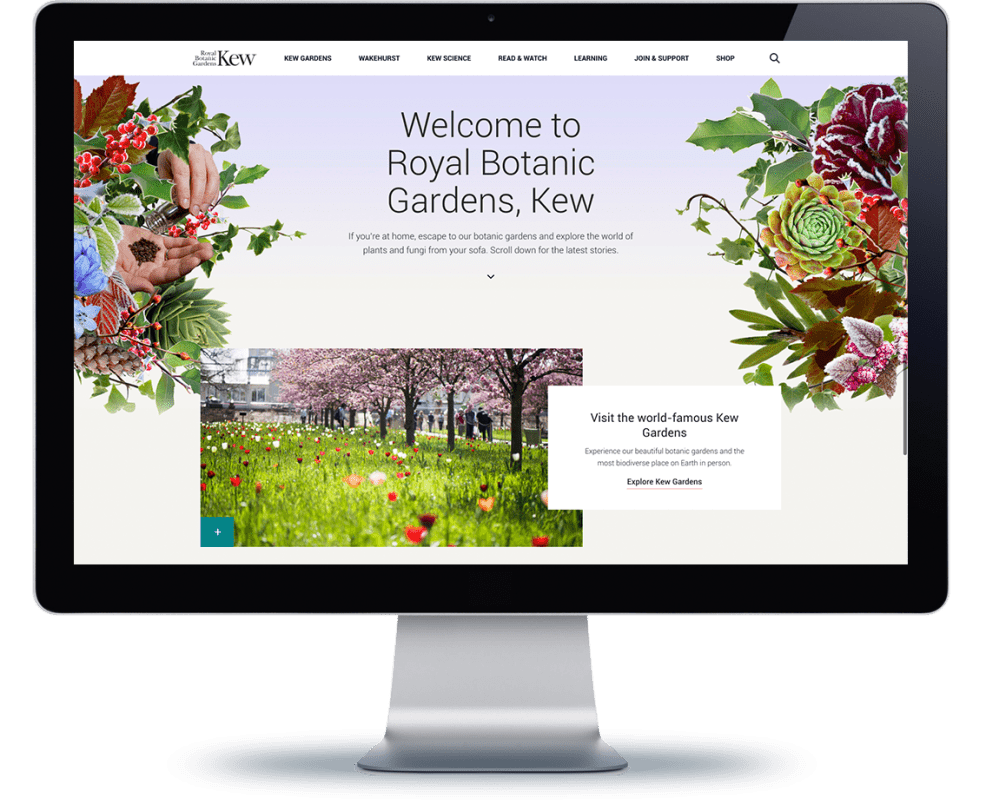
The Royal Botanic Gardens, Kew (Kew Gardens)
Drupal, Acquia Cloud Platform

reduction in bouncerates
The Client:
The Royal Botanic Gardens, Kew (Kew Gardens) is a botanic garden in south-west London. Established in 1840 and servicing close to 2 million visitors a year, Kew Gardens is one of London’s most popular tourist attractions, as well as a leading global scientific resource for plant and fungal knowledge.
The Situation:
Kew’s diverse garden populations and collections are essential tools in understanding how to solve some of the world’s greatest environmental challenges, such as climate change, food shortages and biodiversity loss. The kew.org site plays a critical role in improving the wider understanding of Kew’s mission and values, increasing interest and engagement with Kew’s conservation efforts. The site also supports Kew’s revenue goals by displaying all of its beautiful plant and ornamental attractions to drive ticket sales and donations. The main Kew Garden website averages over 1.5 million page views per month. These users range from potential visitors looking to schedule tours to scientists and institutions interested in the global research conducted by Kew’s staff of 300+ agricultural scientists. As they planned to redesign their site on a new platform, Kew Gardens wanted to enhance the digital experience of their existing website to serve both commercial business objectives and establish their brand mission in the public sector.
The Challenge:
From showcasing their estate to offering information on their ongoing scientific research projects, to helping visitors plan and schedule their garden visit, kew.org serves a diverse range of users all over the world. Kew wanted to have more freedom and flexibility in the types of user experiences available to visitors and build a new website with a stronger information architecture. Kew also needed to enhance the key moments in the user journey, such as booking tour tickets or locating directions.
Kew was interested in a CMS with modern, decoupled capabilities that would allow them to strategically design interactive content for their commercial and tourism audiences while also repurposing and building upon their library of scientific horticultural research. When evaluating potential solutions, Kew also wanted to avoid the rigid constrictions of a proprietary platform that would lock them into working with a single vendor.

The Solution:
The previous Kew website was built in Drupal 7, and the Kew digital team felt that Drupal’s open CMS solution hosted on Acquia Cloud Platform was the best fit in terms of power, scale and security. For the migration project, they worked with Acquia professional services and their digital agency partner, Manifesto, to build a new website that provided greater control over the user experience and more responsive applications for delivering content. The decision to use an open source CMS allowed Kew’s team to complete a successful redesign without starting from scratch and implementing a new platform, saving both time and resources.
The Results:
After completing their relaunch with the combined help of Acquia and Manifesto, Kew saw significant improvements to the user experience. The partner’s digital team used Drupal to develop design templates that could be reused across the site, making it simpler for site editors to host and organize their wide variety of content and resources. Since relaunching kew.org in March 2019, the new site has increased user engagement and average bounce rate decreasing 19.9%.